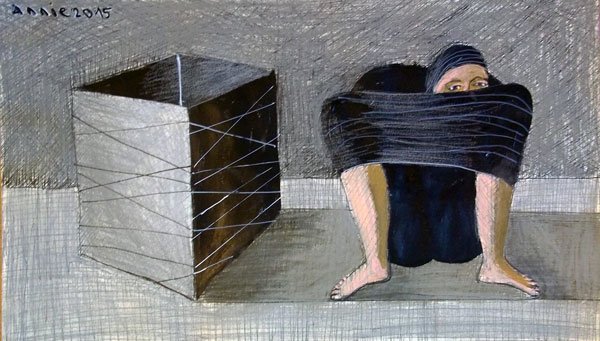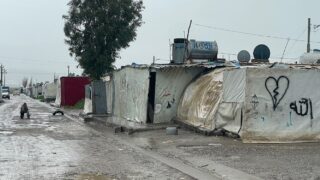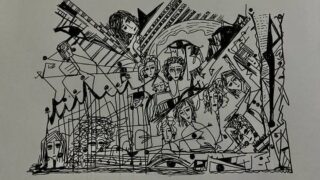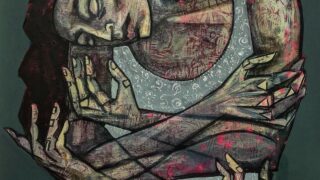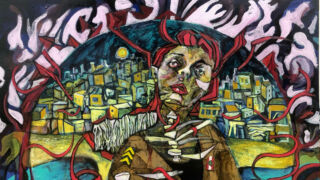
This publication has benefited from the support of the Rosa Luxemburg Foundation. This text may be reproduced in part or in full, provided the source is acknowledged.
Ten-year-old Zainab was sound asleep in her mother’s arms at their home in Baghdad’s Al-Sadr City. It was a mid-April night in 2022, when her father, possessed by the idea of “honor”, decided to smack the girl in the head with a heavy stick, cracking her skull and breaking her teeth and ribs. "The girl is a disgrace!" He shouted as he grew determined to kill the child. Zainab passed away, and news of her brutal murder created ripples and provoked indignation among Iraqis. The widely denounced crime was shocking to public opinion especially because the victim did not commit any "sin." In fact, her father had killed her for no other reason than being a girl!
Despite its awfulness, Zainab's murder was not very far from the realities of the ongoing violations and abuses against women and children, which pervade Iraqi society in various forms. In many cases, abuses have led to death, as in Zainab’s case and more than ten other cases registered with the community police during April and May 2022 alone. These cases occurred in various Iraqi areas and were addressed by feminist organization platforms, such as the Iraqi Women's Rights Organization, the Women's Freedom in Iraq Organization, and "She is Revolution" (1) platform.
In addition to murders, there are cases of women committing suicide. Some are believed to be masked murders recorded as suicide cases so the perpetrator can evade accountability. Domestic and community violence continues in Iraq with no legal deterrent and a complete lack of serious protection for the victims. Chaos and neglect still plague the country and are exacerbated in the most miserable areas. Also, legal protection against digital extortion and harassment is almost non-existent. According to statistics (2) produced by the Iraqi Ministry of Planning and published by the Iraqi News Agency in 2021, the violence practiced by a husband against his wife ranges from economic violence by 22%, verbal abuse by 12%, physical violence by 3.6%, and sexual violence by 1.8%.
In general, 29% of women in Iraqi society are exposed to violence in all its forms. When taking into account that this percentage is calculated amid the chaos and poor coordination that pervades state institutions in Iraq, one can only imagine that the real numbers are far worse.
The turning point
The deterioration in women's conditions, in particular, began with the start of the economic embargo in Iraq in 1991, which was a turning point in the living conditions and, consequently, the social relations in the country. The educated middle class had withered, and education was no longer considered the social capital it once was. It was replaced by financial status and proximity to centers of power, be they governmental, tribal, or religious.
Due to the weakness of the civil law and its inability to protect them, Iraqis, in the city and the countryside alike, started looking for their tribal lineages to take refuge under their clans’ wings and by their tribal laws. Hence, they increasingly submitted to tribal customs, which included specific norms that defined how to treat women, how to deal with women's education and work, as well as personal family status. People returned to practice customs and traditions that they had previously rejected. At that point, there was a religious tide encouraged by the government to control the feelings of discontent with the deteriorating economic situation and to divert people's focus from the follies of the dictator - who had led the country into a pit - to the religious occult that people clung to like an escape, so that they can bear the hardships of life.
Caught by unemployment, debt, and tribal customs, many women and girls have come to be treated as property or goods. There are recorded cases of fathers who settled their financial debts by giving a daughter as “payment” to the creditor. There are other cases recorded in which parents are forced to marry off their daughters for fear of poverty or to meet some of the family's needs through the dowry paid by the groom.
Many Iraqi women have realized that the marriage of tribalism and religion, amid the spread of weapons, the overwhelming lawlessness, and the tyranny of financial power all create the chaos that is the basis for their continued oppression. Triggered by the October 2019 popular protests, many women have become actively engaged in dialogues and discussions on social media platforms.
Things only got worse after the US occupation and the fall of state institutions. People's adherence to their tribal origins increased along with their religious/sectarian roots. People were once again associated with their sects due to the presence of sectarian forces, the occupation’s reinforcement of the principle of political quotas based on sect and ethnicity, and the outbreak of sectarian violence. Put simply, if the clan does not protect the people, their religious sects will. This situation had catastrophic ramifications on women and their status, reinforcing notions of "honor versus shame," whereby women bear the responsibility of "not dishonoring" the name of both the clan and the sect. As a result, honor killings and domestic violence soared in Iraq, generating considerable waves of gender-based violence.
Economic violence
The Planning Ministry’s statistics were not surprising when it comes to economic violence, which prevents the victim from accessing resources that guarantee her basic needs without relying on the male perpetrator/s. That may include, but is not limited to, preventing the victim from completing her studies, work, receiving an inheritance, or taking it by force or threat. It also includes seizing her salary or material resources by force, threat, or psychological pressure; forcing the victim to work for the offender's interest and as he deems appropriate; and other forms of control over economic resources.
This type of violence may be the most crucial because it is often the beginning of other types of violence. That is especially true since the popular view, which has been gradually consolidated by the religious tide since the 1990s, sees that it is the responsibility of the husband to provide maintenance to his wife. Women made up 23% of the workforce in Iraq before the international embargo on Iraq, which began in 1990 and lasted for 13 years. That percentage decreased to 15% after the embargo, according to World Bank statistics for 2020 (3).
Caught by unemployment, debt, and tribal customs, many women and girls have come to be treated as property or goods. There are recorded cases of fathers who settled their financial debts by giving a daughter as “payment” to the creditor. There are other cases recorded in which parents are forced to marry off their daughters for fear of poverty or to meet some of the family's needs through the dowry paid by the groom.
Women and the Iraqi Revolution
09-03-2020
With the blessing of the existing religious authority, underage girls constitute the highest proportion of this type of marriage. The percentage of married girls under the age of 18 throughout Iraq reached 25.5%, according to the Ministry of Planning statistics, and the Kurdistan region recorded a slightly lower rate, which is 22.6%. That is in addition to the crime of exploiting underage girls in prostitution and sex services networks run by highly influential figures. It has become difficult to obtain real numbers documenting the number of underage victims who fill the nightclubs under the noses of the authorities who do nothing to save them (4).
Domestic violence
“I have become a disgrace to you, so I will get rid of my life,” a girl from Baghdad wrote these words and left them to her family before she committed suicide in the first week of May 2022. She was neither the first nor the last of the Iraqi women and girls who chose death over life in Iraq. Two days earlier, a girl threw herself off the Jumhuriyyah Bridge in the center of the capital, Baghdad, followed by three other suicides in just one week in Baghdad and Erbil. Suicides among women have increased in recent years to the extent that it has become a phenomenon covered in press reports (5).
The ruling religious parties and their representatives in the Iraqi parliament have insisted on preventing the ratification of any draft law against domestic violence, arguing that it will lead to the disintegration of the Iraqi family.
The phenomenon of suicide has continued throughout the country due to the continuation of its causes and the absence of ways to treat it. Community Police reports recorded more than 700 suicides in 2021, half of which were among women. Once again, many of these suicides are probably domestic violence homicides recorded as suicide. One such example is the crime committed on 20 April 2022. Marwa Ali Falih, a 20-year-old bride in the city of Najaf, had been married just over five months, when her husband claimed that she has committed suicide by hanging, while her body showed signs of severe beating and torture (6). The case is still under investigation, as are many similar cases that usually end with the perpetrator's impunity.
Hardly a day goes by without news of a crime of domestic violence in Iraq. The victims are often women and children, and the perpetrators are often husbands or fathers. While feminist organizations - the Organization of Women's Freedom in Iraq, Women's Voice Organization, Iraqi Women's Rights Organization, and others - and humanitarian organizations such as the Commission for Human Rights, urgently call for enacting a law against domestic violence, the ruling religious parties and their representatives in the Iraqi parliament have insisted on preventing the ratification of any draft law, arguing that it will lead to the “disintegration of the Iraqi family.”
Those parties and their representatives in Parliament have adhered to legal articles that allow and justify violations, even though they are old articles belonging to the constitution of the previous regime, which successive governments have claimed to reject. Among these articles is Article 41 of the Iraqi Penal Code No. 111 of 1969, which allows the husband to discipline his wife and fathers to discipline their sons and daughters by beating.
Some of the victims were left with nothing but social media websites to post their stories in the hope that they would cause embarrassment to the authorities so that they would have to take action to protect them. Sometimes they succeed, as happened in the case of the lawyer Ibtihal al-Fartousi who was abused by her four brothers due to an inheritance dispute, and the case of the 12-year-old girl, Israa, whose father took her from her mother’s arm to marry her off by a religious contract which is not certified by the court.
In these two cases, the Iraqi Women's Rights and the Organization of Women's Freedom in Iraq pressured the community police. They launched electronic campaigns and supportive vigils before the Personal Status Court to demand the restoration of the rights of the two victims and retribution from the perpetrators (7). Ordinary citizens, both men and women, have turned into effective agents that pressure the official authorities and reveal their failure to protect people. Under the pressure of these electronic campaigns, the authorities had to intervene more the once to solve problems and rescue victims of violence.
Honor killings
A report (8) prepared by women's rights activist Jannat al-Ghazzi in 2012 has sparked widespread controversy in Iraq. The report resurfaced in 2020, with more than one media platform discussing its details again.
Published by Mosawat Magazine of the Organization of Women's Freedom in Iraq, the report revealed the existence of archaeological hills in the southern Iraqi governorate of Dhi Qar that tribes had been using as mass graves for women killed in the so-called honor crimes. Al-Ghazzi gave horrendous accounts about these hills of “sinful women,” reinforced by stories she had obtained through interviews with residents of the areas near the hills, some of whom were relatives of the victims. The stories included in the report indicated that some of these women were killed simply because they were suspected of breaking tribal norms or because they had been raped. Each clan has a specific lot in those hills where its victims, barred from the regular cemeteries, are buried, fully clothed, without funerals or memorials.
Women took upon themselves the task of defending themselves and their rights and documenting violations without waiting for state institutions, deciding to stand up against the abuses and complicity of these institutions. They also began reviewing the provisions of the Personal Status Law of 1959 and the Penal Code No 111 of 1969. Women's organizations in Iraq have been resisting the religious parties' continuous attempts to pass unfair laws against women, such as the Jaafari personal status law that allows men to marry girls as young as nine.
However, honor killings are not characteristic of one specific region, city, or village in Iraq. The phenomenon has been on the rise in all parts of the country since the US occupation, which brought about chaos and widespread weapons. Patriarchal ideologies coupled with the dominant tribal and religious norms have fostered a stimulating and supportive environment for the perpetrators of these crimes. This is especially true when an article of the law passed by the previous regime and adhered to by the successive Iraqi governments also provides a cover for such crimes. Article 409 in the Iraqi Penal Code No. 111 of 1969 states: “Any person who catches his wife or one of his “Maharem” (women with whom marriage is prohibited, such as a daughter or sister) in the act of adultery or finds her in bed with her lover and kills one or both of them immediately or assaults one of them so that he or she dies or is left permanently disabled is punishable by a prison sentence not exceeding three years.”
In the text of the law, only men are entitled to reduced sentences, whereas if a woman finds her husband in the act of adultery and kills him immediately, her penalty would be either death or lifetime imprisonment, according to the article related to murder in the Iraqi Penal Code. No honor crime is committed against a man unless, according to the abovementioned article, the offender is another man “defending his wounded honor” by killing his wife’s lover. Here, the law has specified adultery in flagrante delicto, not suspicion of adultery, as a precondition for the sentence. This was the case before the US occupation of Iraq and the dissolution of state institutions; however, after 2003, most honor crimes became based on mere suspicion, without any sort of proof. In many cases, honor killings were but an excuse to cover up other family issues, such as limiting inheritance to males, for instance, or hiding the “scandal” of rape, thus killing the women victims of rape twice…
Harassment and rape
"How could a woman who is a victim of rape live without her rapist? Can she marry someone else? How will society view her?" These were the baffling questions of lawyer Safaa al-Lami (9), director of the human rights unit at the Iraqi Bar Association, in response to the astonished talk show host of the TV program “Manchet Ahmar” (“Red Headline”) - broadcast by Al-Sharqiya Channel, which hosted Al-Lami in late May 2022 to discuss Article 398 of the Iraqi Penal Code.
A report revealed the existence of archaeological hills in Dhi Qar Governorate that tribes had been using as cemeteries for women killed in the so-called honor crimes. There are horrendous accounts about these hills of “sinful women,” where each clan has a specific lot for its victims, barred from the regular cemeteries, are buried fully clothed, without funerals or memorials.
No honor crime is committed against a man unless the offender is another man defending his wounded honor by killing his wife’s lover. The law specified adultery in flagrante delicto, not suspicion of adultery, as a precondition for the sentence. However, in many cases, honor killings were an excuse to cover up other family problems, such as limiting inheritance to males or getting rid of a rape “scandal.”
This article, which Al-Lami considered positive, exempts the rapist from punishment if he marries his victim, while the two previous articles 396 and 397 set a term of imprisonment not exceeding seven years for “any person who sexually assaults a man or woman or attempts to do so without his or her consent.” Al-Lami stated in the interview that he "does not wish to discuss the dialectic and philosophy of life and coexistence." For him and the Iraqi legislator who drafted this article, the importance does not lie in the victim, her rights, or the physical and psychological consequences she might suffer. Rather, the importance lies in what is socially known as “covering the disgrace.”
He blames the victim for being raped because, in his opinion, she will carry this stigma to her community. Moreover, the legislator, who claimed to protect the victim from stigmatization, has implicitly stigmatized her. Then he rewarded the rapist for his crime by marrying him off to his victim and releasing him, unpunished, to do as he pleases. Al-Lami's statements aroused the anger of activists and women's organizations, who have been calling for years to repeal Article 398 and replace it with an article or several articles that hold the perpetrator accountable and punishable by law and are respectful to a victim's dignity and rights.
But what if the victim was one of the perpetrator’s “Maharem”, a man, or a child? Article 393, indeed, sets the penalty for harassment of children under 18 with imprisonment not exceeding ten years. But has this article been applied to protect girls under 18 in a country where child marriage is tolerated? Was this article a deterrent to the spread of the phenomenon of harassment? Has harassment increased due to weak and often absent law enforcement mechanisms to the extent that most people are ignorant of the consequences of such actions? Or has it increased because the law and the executive authorities are weak in the face of the force of chaos?
Cyber harassment
Women in Iraq are frequently subjected to cyber blackmail and threats. Hacking electronic devices has become a profession that some join to earn quick money. Although a security unit that combats cyber extortion cases in Iraq exists, it has limited capacity and authority. It is also limited by complex societal relations and weak or non-existent laws. Therefore, many girls and women are at the mercy of blackmailers hackers who may be able to get hold of private pictures then threaten to publish them. The victim usually hesitates and refrains from filing a complaint against the blackmailer for fear of being scandalized or shunned by her family and society, which often blame the victim. The phrase "the girl is a disgrace," which led to crushing young Zainab's head is nothing novel. Society has been playing that broken record on a loop, as if women were born bearing that "shame" even before they get the chance to experience life or commit "sins."
Patriarchal ideologies coupled with the dominant tribal and religious norms have fostered a stimulating and supportive environment for the perpetrators of these crimes. This is especially true when an article of the law passed by the previous regime and adhered to by the successive Iraqi governments also provides a cover for such crimes. Article 409 of the Iraqi Penal Code No. 111 of 1969 punishes the perpetrator of “honor killing” with imprisonment for a period not exceeding three years.
However, the matter does not only involve threatening to publish private photos and information. Several women have been receiving assault and death threats, especially after news spread about the slaughter of a young woman in Egypt at the hands of a criminal harasser on 20 June 2022. Two days later, a young woman was murdered in Jordan under similar circumstances, after her stalker threatened to “do as that man had done to the girl in Egypt.” Soon, similar threats began appearing on social media websites, citing the two previous incidents and threatening to replicate them in Iraq (10). This terrifying atmosphere has prompted the Women's Rights Organization in Iraq to start publishing safety instructions for girls and women who felt in danger. Sometimes, they were even advised to carry a sharp tool for self-defense (11), as these women lived in a state of anxiety in the face of a threat of physical abuse or murder by an anonymous person with no effective deterrent.
Battle of change
Many Iraqi women have realized that the marriage of tribalism and religion, amid the spread of weapons, the overwhelming lawlessness, and the tyranny of financial power all create the chaos that is the basis for their continued oppression. Encouraged by the October 2019 popular protests, many women have become actively engaged in dialogues and discussions on social media websites. Meanwhile, numerous women’s platforms have emerged and launched extensive campaigns against harassment. For example, the Iraqi Women's Rights Platform has launched the “Expose a Harasser” campaign to encourage women to photograph and expose those who harass them in public and at home. There is also the Protection Against Domestic Violence Act campaign, which included vigils staged by feminist organizations (12) and media campaigns in which feminist activists discussed the need for legislating this law (13) and the abolition of old laws that facilitate the oppression of women and the violation of their rights.
Legal impotence, the complicity of political powers, and the absence of government institutions have all accentuated the need for reactivating human rights initiatives at a grassroots level, whether individually or through establishing human rights and social non-governmental organizations. Women took upon themselves the task of defending themselves and their rights and documenting violations without waiting for state institutions, deciding to stand up against the abuses and complicity of these institutions. They also began reviewing the provisions of the Personal Status Law of 1959 and the Penal Code No 111 of 1969.
Women's organizations in Iraq have been resisting the religious parties' continuous attempts to pass unfair laws against women, such as the Jaafari personal status law that allows men to marry girls as young as nine. They have also resisted attempts to amend Article 57 of the Personal Status Law No. 188, by which mothers are granted custody over their children until they reach the age of 15. It also allows a divorced woman to remarry without losing custody over her children unless certain circumstances exist based on which the court decides to deprive her of custody.
The proposed amendment, if adopted, will grant a divorced woman maternal custody only until her child reaches the age of seven, provided she does not remarry (14). After that age, custody is passed to the father and the paternal grandfather. In reaction, feminist organizations have launched demonstrations and demand rallies (15) in several Iraqi governorates such as Basra, Baghdad, and Maysan. They used the hashtag #We_Oppose_the_Amendment_of_Article_57 to propel their campaign, which succeeded in freezing the amendment more than once, even if for a while.
While institutional bodies and service sectors in Iraq teeter on the edge of collapse, women continue to suffer due to the absence of legal protection, which leads many of them to commit suicide to escape the injustices inflicted upon them. However, Iraqi women are working towards change, mobilizing and raising awareness in an attempt to pass laws that protect victims and achieve social justice. They may have found themselves on the longest and steepest path to attain this goal. However, it seems to be the most effective path in the long run, because it has nothing to do with government and political agendas and everything to do with the entrenched social reality of women in Iraq.
The content of this publication is the sole responsibility of Assafir Al-Arabi and Rosa Luxemburg Foundation cannot accept any liability for it.
Translated from Arabic by Sabry Zaki
Published in Assafir Al-Arabi on 14/07/2022
1- Instagram username addresses: @owfi.Iraq, @iraqi_women_rights, @she_wrevolution
2- https://www.ina.iq/144902--11-.html
3- https://bit.ly/3z585Lu
4- https://www.instagram.com/tv/CeYoS7LK7XK/?igshid=MDJmNzVkMjY=
5- Such as the report prepared by Suha Odeh on the phenomenon of women suicide in the city of Mosul, and the report prepared by the NRT News Network on the suicide of women in Iraq https://www.nrttv.com/Ar/detail3/3772
6- https://www.youtube.com/watch?v=a1-yS_SrC5c
7- https://www.instagram.com/p/CWiWR64qMtS/?igshid=MDJmNzVkMjY=
8- http://almousawatj.blogspot.com/2012/02/blog-post_4265.html
9- https://www.youtube.com/watch?v=wMvmRT9e2ZY
10- https://www.instagram.com/p/CfMO9ihqwv3/?igshid=MDJmNzVkMjY=
11- https://www.instagram.com/p/CfMcKm3qG4w/?igshid=MDJmNzVkMjY=
12- https://bit.ly/3BGc4jq
13- https://www.youtube.com/watch?v=twoVVKAMKxQ
14- https://www.youtube.com/watch?v=kIp25pdgbVk
15- https://www.youtube.com/watch?v=bhSCv8XVkT8

